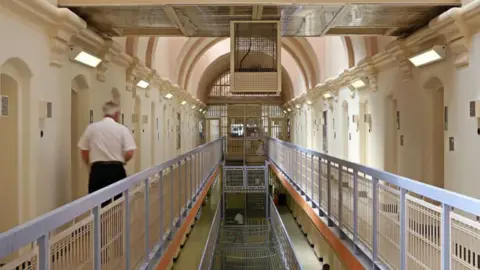Make more use of open prisons, former minister says
 Getty Images
Getty ImagesMore prisoners should go to open prisons to help reduce reoffending, the man leading a sentencing review for England and Wales has suggested.
David Gauke told the BBC's World At One programme the focus should be on rehabilitation, including allowing inmates to leave prison to study and work during the day.
The former Conservative justice secretary has been called in by the government to review sentencing and tackle overcrowding.
His comments follow his visit to prisons in Spain, where reforms have seen 25% of inmates placed in open prisons.
Speaking to the Times, Gauke said the policy of using low-security open prisons saved money and better prepared inmates for release which made them less likely to reoffend.
Gauke served as justice secretary between 2018 and 2019 under Theresa May.
The sentencing review, which was a manifesto pledge, is expected to consider scrapping short sentences and toughening up community orders as an alternative to jail.
Gauke told the BBC that Spanish open prisons focus on ensuring that when prisoners reach the end of their custodial sentence, they are "as prepared as possible for life outside".
He said strong relationships with family members, employment and secure housing were three factors that helped decrease the chance of reoffending, but added open prisons were not a "silver bullet" to fix the problem of overcrowding.
"Unavoidably we have to make some tough decisions," he said. "If we can bring down the levels of reoffending, we can bring crime down and there will be fewer victims."
The government has already released 5,500 prisoners early in an emergency plan to free up cells and stop the justice system collapsing, and has also announced a sentencing review aimed at providing more non-custodial sentences.
The policy is due to be reviewed in 18 months.
There are currently 85,877 people in prison across England and Wales, according to latest Ministry of Justice figures released on 23 December. The current operational capacity for prisons is 88,688.
The Ministry of Justice has promised to find a total of 14,000 cell spaces in jails by 2031.
Some 6,400 of these will be at newly built prisons, with £2.3 billion towards the cost over the next two years.
Earlier in December, Justice Secretary Shabana Mahmood told BBC Radio 4's Today Programme that just building more prisons will not solve the overcrowding crisis.
Asked whether the estate would be short of cells within three years, even with 14,000 extra places, Mahmood said: "We will run out because even all of that new supply, with the increase in prison population that we will see as a result of that new supply, doesn't help you with the rise in demand, because demand is still rising faster than any supply could catch up with."
Gauke has also said that building more prisons is not the answer and a more "strategic" approach is needed to free up space.
The sentencing review is expected to make its recommendations in the spring.
